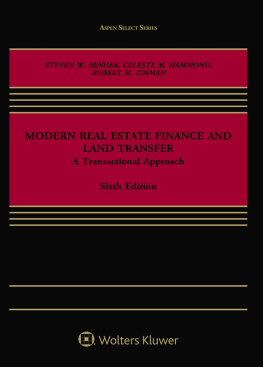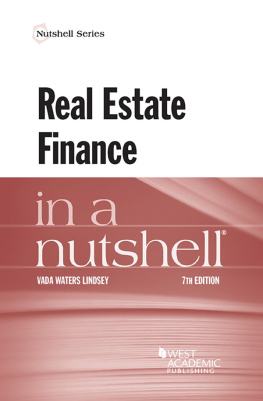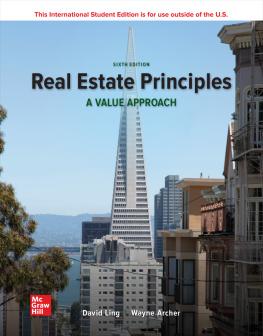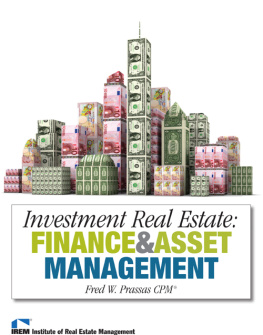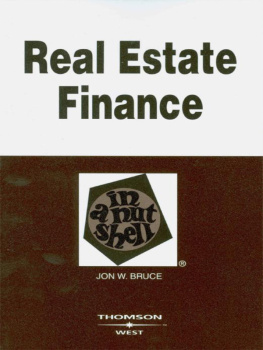MODERN REAL ESTATE
FINANCE AND
LAND TRANSFER
EDITORIAL ADVISORS
Rachel E. Barkow
Segal Family Professor of Regulatory Law and Policy
Faculty Director, Center on the Administration of Criminal Law
New York University School of Law
Erwin Chemerinsky
Dean and Professor of Law
University of California, Berkeley School of Law
Richard A. Epstein
Laurence A. Tisch Professor of Law
New York University School of Law
Peter and Kirsten Bedford Senior Fellow
The Hoover Institution
Senior Lecturer in Law
The University of Chicago
Ronald J. Gilson
Charles J. Meyers Professor of Law and Business
Stanford University
Marc and Eva Stern Professor of Law and Business
Columbia Law School
James E. Krier
Earl Warren DeLano Professor of Law
The University of Michigan Law School
Tracey L. Meares
Walton Hale Hamilton Professor of Law
Director, The Justice Collaboratory
Yale Law School
Richard K. Neumann, Jr.
Professor of Law
Maurice A. Deane School of Law at Hofstra University
Robert H. Sitkoff
John L. Gray Professor of Law
Harvard Law School
David Alan Sklansky
Stanley Morrison Professor of Law
Faculty Co-Director, Stanford Criminal Justice Center
Stanford Law School
ASPEN SELECT SERIES
MODERN REAL ESTATE
FINANCE AND
LAND TRANSFER

A Transactional Approach
Sixth Edition
Steven W. Bender
Professor of Law and Associate Dean for Planning and Strategic
Initiatives
Seattle University School of Law
Celeste M. Hammond
Professor of Law and Director of Center for Real Estate
The John Marshall Law School
Robert M. Zinman
Professor of Law (Ret.)
St. John's University

Copyright 2018 Steven W. Bender, Celeste M. Hammond, and Robert M. Zinman.
Published by Wolters Kluwer in New York.
Wolters Kluwer Legal & Regulatory U.S. serves customers worldwide with CCH, Aspen Publishers, and Kluwer Law International products. (www.WKLegaledu.com)
No part of this publication may be reproduced or transmitted in any form or by any means, electronic or mechanical, including photocopy, recording, or utilized by any information storage or retrieval system, without written permission from the publisher. For information about permissions or to request permissions online, visit us at www.WKLegaledu.com, or a written request may be faxed to our permissions department at 212-771-0803.
To contact Customer Service, e-mail
customer. ,
call 1-800-234-1660, fax 1-800-901-9075, or mail correspondence to:
Wolters Kluwer
Attn: Order Department
PO Box 990
Frederick, MD 21705
e-ISBN: 978-1-5438-0542-0
About Wolters Kluwer Legal & Regulatory U.S.
Wolters Kluwer Legal & Regulatory U.S. delivers expert content and solutions in the areas of law, corporate compliance, health compliance, reimbursement, and legal education. Its practical solutions help customers successfully navigate the demands of a changing environment to drive their daily activities, enhance decision quality and inspire confident outcomes.
Serving customers worldwide, its legal and regulatory portfolio includes products under the Aspen Publishers, CCH Incorporated, Kluwer Law International, ftwilliam.com and MediRegs names. They are regarded as exceptional and trusted resources for general legal and practice-specific knowledge, compliance and risk management, dynamic workflow solutions, and expert commentary.

To my mother, Irene, and to
my son Dominic
S.B.
Love to my husband,
Michael Pensack,
my children,
Geoffrey and Elizabeth,
and my grandchildren,
Hazel & Lander Foubert and Gerard Francis Xavier Hammond
C.M.H.
To Ruth and Arthur Zinman
and to Lillian and Noah Janel
sine qua non
R.Z.
Summary of Contents
Contents
McMaster v. Strickland
.
.
2 . The Function of Postconstruction Financing
.
Problem 4-2
.
Notes and Questions
.
.
.
National Bank of Washington v. Equity Investors
Chapter 7
1 . The Mortgagees Right to Accelerate the Indebtedness
.
Washburn, The Judicial and Legislative Response to Price Inadequacy in Mortgage Foreclosure Sales
.
Heikkila v. Carver
.
.
.
3 . Restrictive Covenants
.
.
.
Mass. Ann. Laws ch. 175, 63(7)
Chapter 12
Shenkman and Marshall, Commercial Real Estate and the 1993 Tax ActParts 1 and 2
.
.
.
Problem 17-4
.
.
Preface
This sixth edition builds on the pedagogical vision of the first edition (then titled Modern Real Estate Financing: A Transactional Approach, by Michael Madison and Robert Zinman), the second edition (that added Steven Bender as coauthor), and the third edition (adding Celeste Hammond). We would like to thank Michael Madison, who has retired from teaching and from this sixth edition, for his contributions to prior editions and foresight on the need for practical skills-based legal education in complicated areas such as real estate transactions.
It has been our experience that most law students are more stimulated when they see some practical value in what they are learning in the classroom. The professor can stimulate students intellectual curiosity to deal with complex issues in land transactions by simulating the real-world conditions of practice and avoiding pedantic discussions of peripheral issues (such as the doctrine of equitable mortgages, which rarely arises in a commercial real estate practice). For this reason, our casebook follows the transactional approach.
In our judgment, freedom of contract still remains the dominant theme in commercial real estate transactions despite the regulatory impact of public law on land investment and development. As long as the real estate project does not fail and the developer remains solvent, general rules of law will normally apply only in the absence of an agreement to the contrary. Perhaps this is because in most commercial real estate transactions the parties will be sophisticatedthey will be represented by counsel and in a position to defend themselves at the bargaining table. For example, at common law the general rule (absent language to the contrary in the mortgage note) is that a lender does not have to accept voluntary prepayment of the mortgage indebtedness prior to maturity. We examine this rule in . But it is of equal if not greater importance for students to see what a typical prepayment privilege provision looks like and to understand the legal consequence of using one drafting approach as opposed to another. As counsel someday, students will be able to not only solve present problems but also avoid potential problems for their clients. This is what real estate planning that adds value to transactions is all about.
Next page
